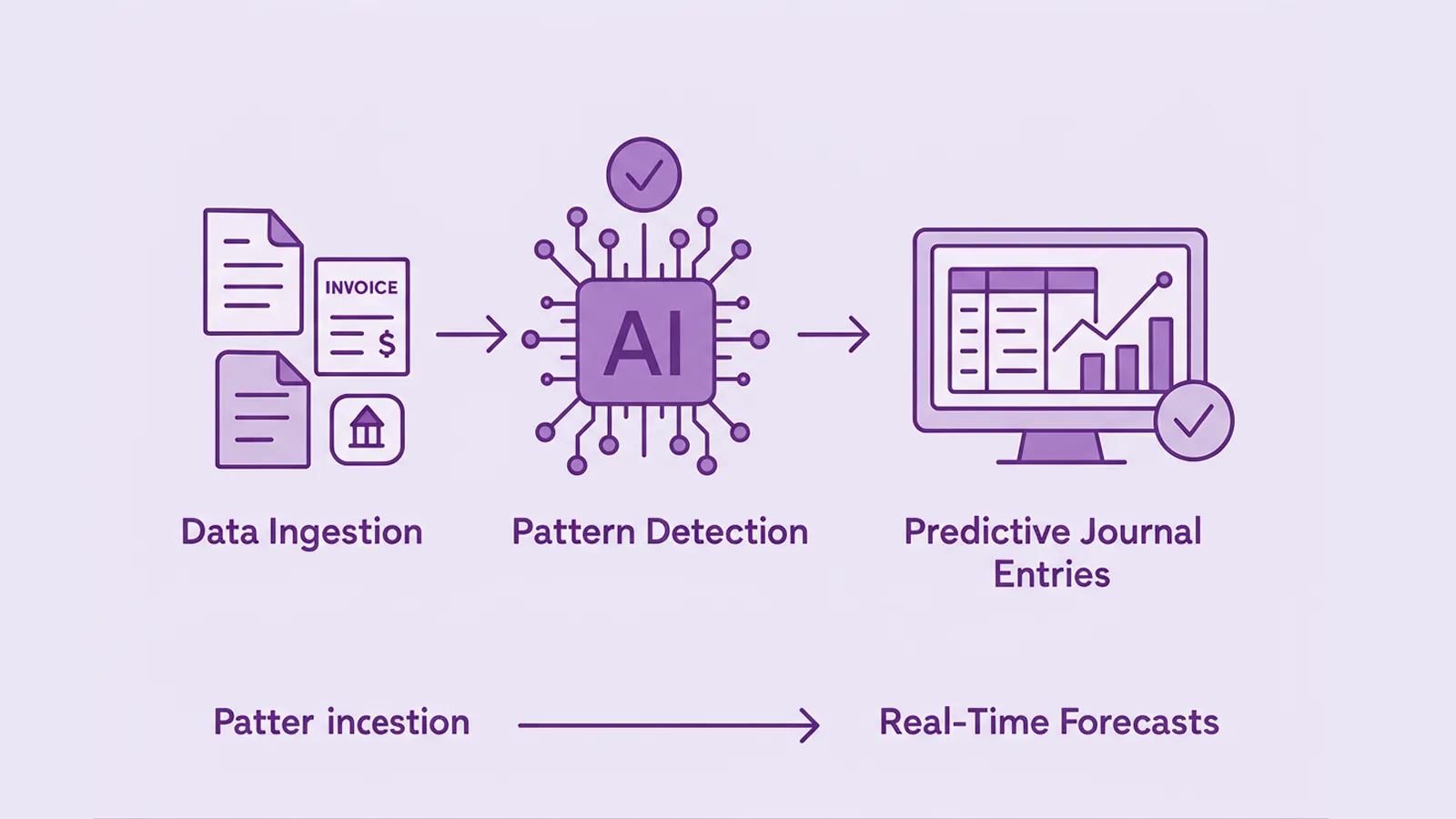How to use AI for Predictive Accounting in Your Startup?
.webp)
For startups managing tight runways, and knowing what lies ahead financially is just as important as tracking what’s already happened. Accounting plays a crucial role here. It records, organizes, and interprets your company’s financial activity to help you understand where you stand. There are 2 ways to do it.
The first way, traditional accounting, gives you a rearview mirror. It shows what happened last month or last quarter. Predictive accounting, on the other hand, gives you a windshield. It helps you see where your business is heading before the numbers show up in your books.
It uses artificial intelligence to analyze patterns in both historical and live financial data. With that, startups can forecast outcomes like cash flow, expenses, and revenue trends in real time. This shift allows founders to plan ahead, avoid unexpected shortfalls, and make data-backed decisions with confidence while staying focused on growth instead of bookkeeping.
What Is Predictive Accounting? How Does It Work with AI?
Predictive accounting combines financial data and artificial intelligence to look ahead instead of behind. It processes historical and live data, detects spending or revenue patterns, and predicts what’s likely to happen next. This method can help predict cash flow shortages, expense spikes, or growth opportunities.

In practice, this means startups can see their financial future in real time rather than waiting for monthly reports.
Here’s how predictive accounting with AI works:
- It combines data from revenue, expenses, and external sources like bank feeds or sales platforms.
- It uses machine learning models to forecast outcomes such as cash flow, profitability, and runway.
- It automatically generates predictive journal entries and forward-looking financial reports.
- It provides always-on insights without needing manual updates or complex modeling.
Why Predictive Accounting Is Especially Useful for Startups
Startups move fast, markets shift, revenue fluctuates, and expenses pile up quicker than expected. In this high-speed environment, waiting for monthly or quarterly reports can lead to delayed reactions.
Predictive accounting bridges that gap by giving founders real-time financial foresight. It doesn’t just tell you what happened, it tells you what’s about to happen:-
i) Predictive Accounting Detects Financial Risks Before They Escalate
For early-stage startups, cash flow can make or break survival. Predictive accounting uses AI to analyze live financial patterns and flag risks such as liquidity crunches, delayed payments, or escalating costs. Instead of discovering these issues too late, founders get early alerts that help them adjust spending, plan for shortfalls, or trigger fundraising activities in time.
ii) It Helps You Make Faster, Smarter Operational Decisions
As startups grow, financial decisions become increasingly complex. Predictive accounting simplifies these trade-offs by showing how different choices affect future cash flow. For example, you can simulate the financial impact of adding new team members or expanding to new markets before committing resources.
iii) Scale Confidently with Real-Time Foresight
Scaling requires precision. Too cautious, and you slow growth; too aggressive, and you risk overspending. Predictive accounting helps founders find that balance.
By using AI-driven forecasts, startups can model different revenue or expense scenarios, plan for expansion, and manage burn rates strategically instead of reactively.
Here’s how predictive accounting empowers startups:
- It identifies cash shortfalls before they occur, allowing time to plan or raise capital.
- It helps founders react quickly to shifts in revenue or rising expenses.
- It supports planning across hiring, product development, and fundraising with data-driven foresight.
In essence, predictive accounting gives startups a financial early-warning system. It replaces uncertainty with insight so that founders can scale faster, react smarter, and stay in control no matter how fast their business evolves.
What Are the Key Benefits of Predictive Accounting for Founders
Predictive accounting gives founders an entirely new level of visibility into their business. Instead of waiting for end-of-month reports, you can see what’s likely to happen tomorrow.
Here’s how these benefits translate into real, everyday impact for startups:-
i) Make Financial Planning More Confident
Traditional accounting tells you what already happened. Predictive accounting tells you what’s coming next. By combining AI forecasts with live data, founders can create flexible budgets that adjust to real-world changes like shifts in sales, funding, or customer churn. This allows you to plan with confidence instead of guesswork.
ii) Catch Financial Risks Before They Escalate
Cash flow surprises are one of the biggest threats to startup survival. Predictive accounting continuously analyzes your data to spot early warning signs like delayed receivables or rising operational costs.
iii) Allocate Resources More Strategically
With predictive insights, founders can make smarter calls about where to spend, hire, or cut back. AI-driven projections show how different decisions will affect future cash flow, helping startups align investments with priorities such as product development, hiring, or marketing.
iv) Strengthen Investor Confidence with Data-Backed Decisions
When you can present forward-looking numbers instead of static reports, investors notice. Predictive accounting signals operational maturity. It shows you’re not just tracking performance but actively managing it. This boosts investor trust and makes fundraising conversations more credible and data-driven.
How Startups Use Predictive Accounting in Real Scenarios
Predictive accounting is something founders can use every day to make smarter, faster decisions. Whether you’re managing cash flow, timing your next fundraise, or planning a new product launch, AI-driven insights help you see the financial impact of your choices before you act. This turns accounting data into a decision-support tool instead of a reporting burden.
.webp)
Startups apply predictive accounting in different ways depending on their stage and goals. Early-stage companies often use it to monitor runway and expense trends, while growth-stage startups rely on it to plan expansions or product rollouts. Across both, the goal is the same: financial clarity without manual guesswork.
Here’s how predictive accounting supports real-world startup decisions:
- Forecast cash flow based on current spend and sales pipeline, helping founders plan for shortfalls or surpluses in advance.
- Predict large upcoming expenses using historical trends, such as vendor renewals, marketing spikes, or equipment costs.
- Model financial outcomes for new product launches, assessing how pricing or adoption rates might affect profitability.
- Prepare fundraising scenarios with confidence, using accurate forecasts to show investors future growth and return potential.
With predictive accounting, startups gain more control over their future. Instead of reacting to financial challenges, founders can anticipate them, and turn insights into action faster than ever before.
How Inkle Helps Startups Implement Predictive Accounting with AI
Predictive accounting can sound complex but Inkle makes it simple and accessible for startups of any size. Designed for founders, Inkle brings together automation, forecasting, and real-time reporting in one intuitive platform. It turns raw financial data into predictive insights that help you plan cash flow, manage risks, and make smarter decisions without hiring a full finance team.
i) Inkle Automates Financial Forecasting with Real-Time Accuracy
Inkle’s AI engine continuously analyzes live accounting data to forecast cash flow, revenue, and expenses. It learns from historical transactions and current trends, updating predictions automatically as your business changes. This means founders always have an up-to-date picture of their company’s financial health. No manual modeling or spreadsheet crunching required.
ii) It Gives You Predictive Insights that Guide Every Decision
With built-in forecasting and visual dashboards, Inkle helps startups move from reactive to predictive decision-making. You can instantly see how a hiring decision, marketing push, or pricing change will affect future cash flow. These projections help founders balance growth with stability, ensuring the company stays on track with its financial goals.
Here’s how Inkle simplifies predictive accounting for startups:
- It delivers real-time cash flow forecasting and risk alerts based on your live financial data.
- It automates predictive journal entries and expense projections with precision.
- It provides integrated dashboards that convert financial trends into actionable insights.
ii) Predictive Accounting, Simplified for Startup Growth
Inkle removes the barriers that often make predictive accounting seem out of reach. No complex integrations, no steep learning curve; just clean, continuous insights that help founders focus on what truly matters: building and scaling their business.
Want to see predictive accounting in action? Book a demo with Inkle and experience how AI can help you plan smarter, move faster, and stay financially confident.
Frequently Asked Questions
What’s the difference between predictive and traditional accounting?
Traditional accounting focuses on recording and analyzing past transactions. Predictive accounting uses AI to forecast future outcomes like cash flow, revenue, and expenses based on real-time data. It helps founders act before issues arise instead of after they occur.
How accurate are AI-driven financial forecasts?
The accuracy of AI forecasts depends on the quality and completeness of your data. However, AI models continuously learn from new transactions and patterns, which means they typically become more accurate over time often outperforming manual projections.
Do I need special tools to use predictive accounting?
Yes, predictive accounting requires AI-enabled tools that can process live financial data, detect patterns, and generate forecasts automatically. Inkle handles all this in the background, so founders don’t need technical expertise to use them.
Is predictive accounting only useful during fundraising?
Not at all. While it helps founders present credible, forward-looking numbers to investors, predictive accounting is valuable year-round. It supports day-to-day financial management, hiring plans, product launches, and budgeting with real-time visibility.
Can predictive accounting help with financial risk management?
Yes. AI models can detect early signs of trouble like increasing costs, shrinking margins, or delayed payments long before they become serious problems. This allows founders to act early, adjust plans, and protect the runway.
How is predictive accounting relevant to early vs. later-stage startups?
Early-stage startups use predictive accounting to monitor runway, manage expenses, and plan fundraising. Later-stage startups rely on it for scenario modeling, scaling decisions, and optimizing operations across multiple markets or product lines.


.webp)
.webp)
